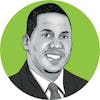 See
more of the story
See
more of the story
My parenting style requires conversation.
I always have something to say to my three daughters. I provide life advice. I share my concerns. I offer my 2 cents. (Maybe a few nickels, too.) I tell them I love them. I ask them about their lives. And I demand to know the name of that one group that sings that one song we heard that one time.
They often think it's too much. They're not wrong.
I think I understand the origins of my constant chatter.
I was 8 or 9 years old when my father and I would venture to my grandfather's house on Saturday afternoons, sometimes after a haircut or an A&W Root Beer stop. By then, death had sent its notice that my independent grandfather, the broad-shouldered man with a sharecropper's hands, might not live much longer.
I think that's why my dad took me with him on those weekend trips. He wanted me to meet my grandfather. Maybe he, in some ways, felt as if he were still getting to know him, too.
In that living room, the one with the squeaky hardwood floors and the fluffy beige couch, two men and a boy would sit and watch old westerns together. My father and grandfather communicated with head nods and shoulder shrugs. There were few words on those Saturdays.
I learned then that some men prefer to speak with their silence.
My father loved to cheer at my games. He attended every event. During football season, he would sit in the stands on frigid fall evenings in Wisconsin. Every teacher at my high school knew him.
Folks in our community did, too. They still do.
On our rides home, we would turn on a good gospel song or jazz ballad. Then, we'd laugh at one of Milwaukee's zany radio hosts. But some days, we would sit quietly together on those treks around the city.
My father loved me through his presence. Even when he did not know what to say — or could not say — he chose to be there.
Today, I am there for my three girls, too.
My SUV is now full of things that did not exist before they were born: small toys stuffed between seats, water bottles left behind by friends and the scents from new perfumes purchased by teenage girls who swear the smells are not as strong as I suggest.
My relationship with my daughters emphasizes safety, vulnerability and dialogue.
It also unveils my flaws.
"You know," my oldest daughter told me last week, "sometimes you shut down when you're frustrated or bothered by something.
You just … stop talking."
I'm still learning how to communicate with them.
I have found, however, that fatherhood is just a journey to express love — albeit imperfectly — to those we cherish.
As a young father, I wanted that picturesque experience through fatherhood. I hid my challenges and obstacles. I pretended I was OK when I was not. And I tried to be the father I thought those around me would admire — one who had it all figured out.
But the pursuit of perfection only made this journey more difficult. I just wanted to make an impression then.
Today, we make memories.
The trips to the beach that leave our seats damp for a few days. The chuckles in the living room in warm Minnesota summers.
Or whenever my youngest daughter yells, "Survey says!" when we watch Steve Harvey on Family Feud or my 12-year-old giggles about whatever she's always giggling about or my oldest daughter jokes about the bald spot at the top of my head that seems to grow every three months.
On Saturday afternoons, I watched old westerns with my father and grandfather that featured strong-willed men who would die for something or someone they loved. But that noble gesture happens in Hollywood more often that it does in real life. A father's true death is more symbolic but tangible: It's about burying the idea that our children deserve anything less than everything we have to give.
Fatherhood is not only a responsibility and an obligation. It is a privilege and an opportunity to embrace growth — and the rocky path that often precedes it.
Sometimes, I'll think about those Saturdays with my father and grandfather and I'll wonder why they did not say more to one another before the latter's death. I was young then, so maybe I'm misremembering, but I always felt like my father wanted to speak more but didn't know if he should or if he could.
Instead, they enjoyed their movies, a salve for whatever fueled the silence. But those experiences informed his life as a father who made sure that whenever I looked up in the stands or in the crowd at an event, he was there. Cheering.
I know now that he was talking to me with the love language he understood.
And I hope one day my daughters will also recognize that when I talk too much — or not enough — I'm only being the father I know how to be right now.
Myron Medcalf is a local columnist for the Star Tribune and a national writer and radio host for ESPN. His column appears in print on Sundays twice a month and online.






